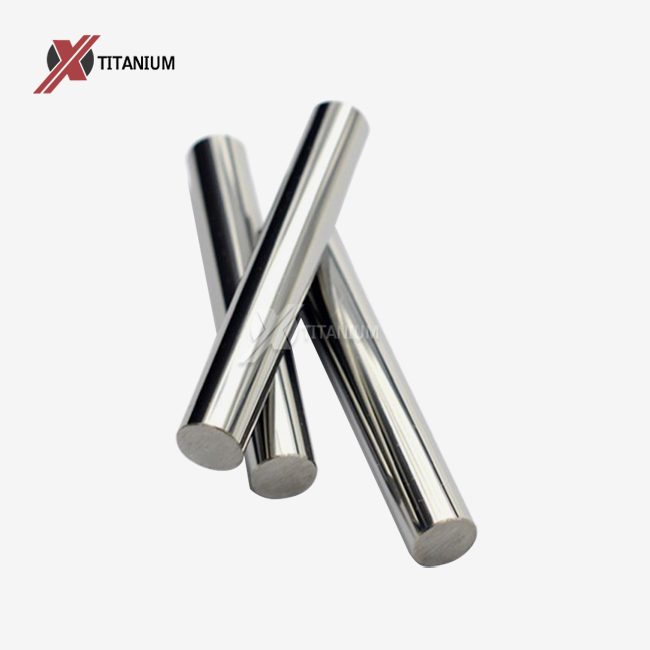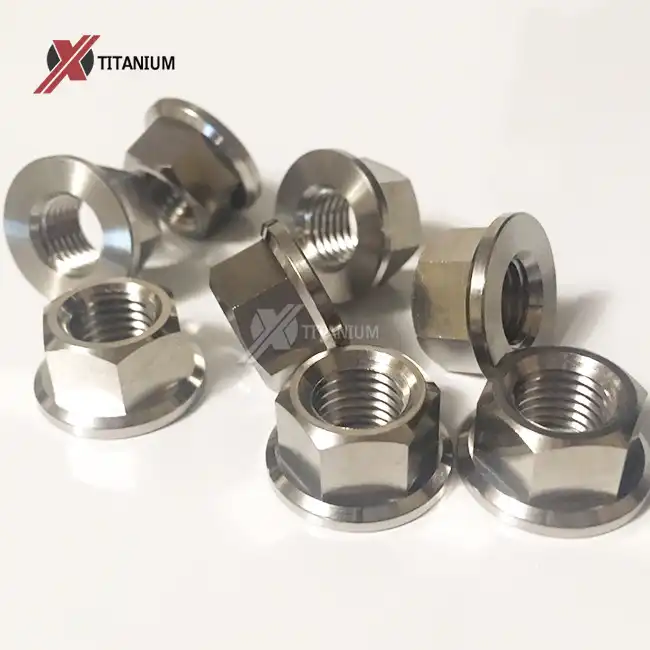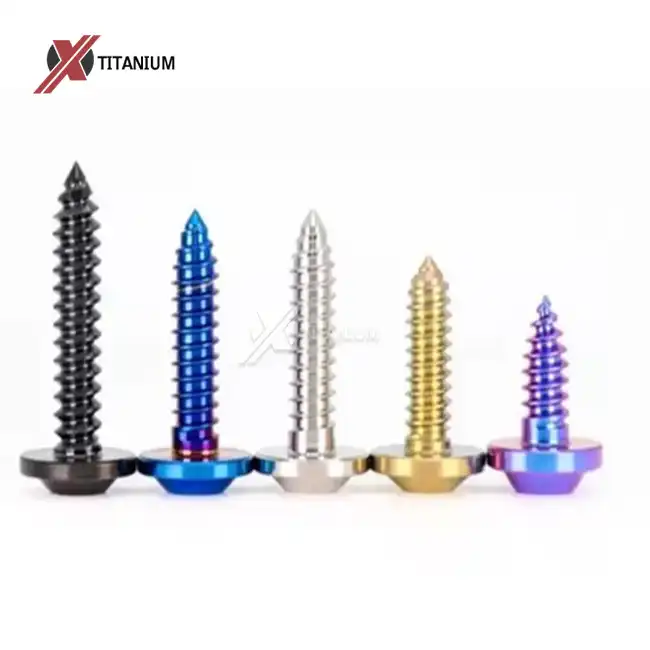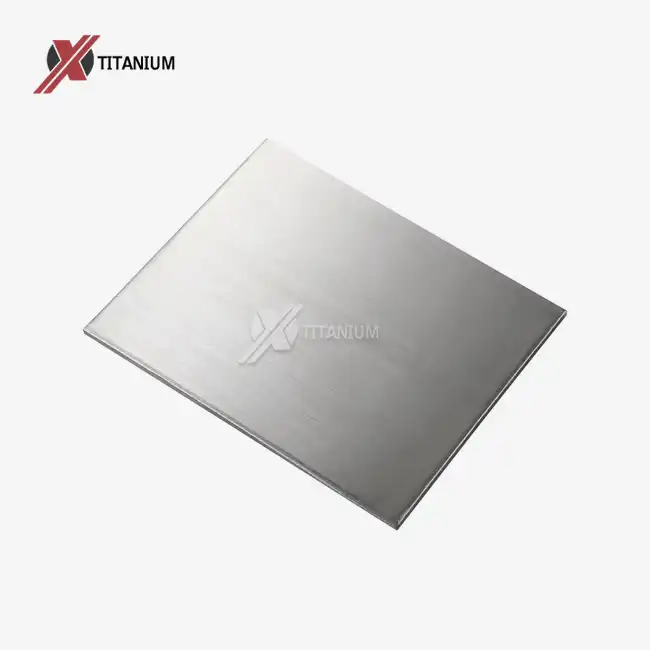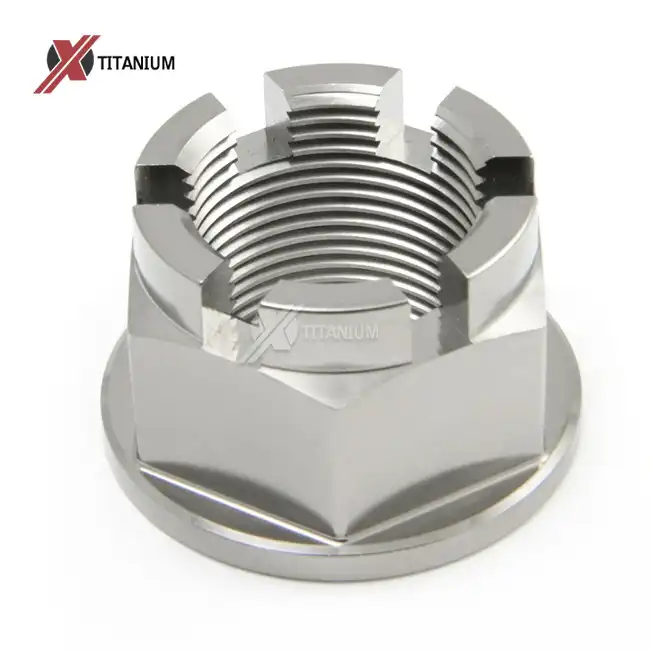Properties and Characteristics of Grade 2, 5, and 7 Titanium Rods
Grade 2 Titanium: The Versatile Performer
Grade 2 titanium, often referred to as commercially pure titanium, boasts exceptional corrosion resistance and formability. Its moderate strength and excellent ductility make it a popular choice for various applications. Grade 2 titanium rods exhibit a tensile strength of approximately 345 MPa and a yield strength of 275 MPa. These properties make them ideal for use in chemical processing equipment, heat exchangers, and marine environments where corrosion resistance is paramount.
Grade 5 Titanium: The High-Strength Alloy
Grade 5 titanium rod, composed of 90% titanium, 6% aluminum, and 4% vanadium, is renowned for its exceptional strength-to-weight ratio. This alloy demonstrates a tensile strength of around 900 MPa and a yield strength of 830 MPa, significantly higher than Grade 2. The addition of aluminum and vanadium enhances its mechanical properties, making it the go-to choice for aerospace components, medical implants, and high-performance automotive parts. Grade 5 titanium rods also exhibit excellent fatigue resistance and maintain their properties at elevated temperatures up to 400°C (752°F).
Grade 7 Titanium: The Corrosion-Resistant Specialist
Grade 7 titanium, a modified version of Grade 2 with added palladium, offers unparalleled corrosion resistance in highly aggressive environments. The palladium content, typically 0.12-0.25%, significantly enhances its resistance to crevice corrosion and reducing acids. Grade 7 titanium rods maintain similar mechanical properties to Grade 2 but excel in applications involving extreme chemical exposure. They are frequently utilized in chemical processing equipment, desalination plants, and offshore oil and gas installations where resistance to harsh chemicals and seawater is essential.
Applications and Industry-Specific Uses of Different Titanium Grades
Aerospace and Aviation
The aerospace industry heavily relies on Grade 5 titanium rod for critical components due to its high strength-to-weight ratio and excellent fatigue resistance. These rods are utilized in aircraft structural parts, engine components, and landing gear systems. The ability of Grade 5 titanium to withstand high temperatures and resist corrosion makes it indispensable in this sector, contributing to improved fuel efficiency and overall performance of aircraft.
Medical and Biomedical Engineering
In the medical field, both Grade 2 and Grade 5 titanium rods find extensive applications. Grade 2 is often used for dental implants and non-load-bearing medical devices due to its biocompatibility and corrosion resistance. Grade 5 titanium rod, with its superior strength, is the preferred choice for orthopedic implants, prosthetics, and surgical instruments. The alloy's ability to osseointegrate with human bone tissue makes it an ideal material for long-term medical implants.
Chemical Processing and Marine Engineering
Grade 7 titanium rods shine in chemical processing and marine applications. Their exceptional resistance to corrosive environments makes them ideal for use in chemical reactors, storage tanks, and piping systems handling aggressive chemicals. In marine engineering, Grade 7 titanium is used for components exposed to seawater, such as heat exchangers, propeller shafts, and offshore structures. The added palladium content provides superior protection against crevice corrosion in chloride-rich environments.
Factors to Consider When Choosing Titanium Grades for Engineering Projects?
Strength Requirements and Load-Bearing Capacity
When selecting between Grade 2, Grade 5, and Grade 7 titanium rods, the strength requirements of the application are paramount. For high-stress applications requiring maximum strength and fatigue resistance, Grade 5 titanium rod is the optimal choice. Its superior tensile and yield strengths make it suitable for load-bearing components in aerospace and medical implants. Grade 2 and Grade 7, while offering moderate strength, are more appropriate for applications where corrosion resistance takes precedence over mechanical strength.
Environmental Factors and Corrosion Resistance
The operating environment plays a crucial role in determining the most suitable titanium grade. In general industrial applications with moderate corrosion risks, Grade 2 titanium provides adequate protection. For highly corrosive environments, particularly those involving reducing acids or chloride-rich solutions, Grade 7 titanium rods offer superior resistance. Grade 5 titanium rod, while offering good corrosion resistance, is primarily chosen for its mechanical properties rather than its chemical resilience.
Cost Considerations and Availability
Budget constraints and material availability are practical factors that influence the choice of titanium grade. Grade 2 titanium is generally the most cost-effective and readily available option, making it suitable for large-scale projects with moderate performance requirements. Grade 5 titanium rod, due to its alloying elements and superior properties, commands a higher price but offers exceptional value in high-performance applications. Grade 7 titanium, being a specialized grade, is the most expensive among the three and may have longer lead times, factors that should be considered in project planning and budgeting.
Conclusion
In comparing Grade 2, Grade 5, and Grade 7 titanium rods for engineering projects, each grade offers distinct advantages tailored to specific applications. Grade 2 provides excellent corrosion resistance and formability for general-purpose use. Grade 5 titanium rod excels in high-strength applications, particularly in aerospace and medical fields. Grade 7 offers unparalleled corrosion resistance for extreme chemical environments. The choice between these grades depends on the project's specific requirements, balancing factors such as strength, corrosion resistance, cost, and environmental conditions. Understanding these differences enables engineers to make informed decisions, ensuring optimal performance and longevity in their projects.
For expert guidance on selecting the right titanium grade for your engineering project, consider reaching out to Baoji Chuanglian New Metal Material Co., Ltd. Our team specializes in titanium products, including high-quality grade 5 titanium rod, and can provide tailored solutions to meet your specific needs. Contact us at info@cltifastener.com or djy6580@aliyun.com for personalized assistance and to explore our range of titanium products.
FAQ
What surface finishes are available for titanium rods?
Titanium rods can be finished with various surface treatments, including bright, polished, pickled, acid cleaned, and sandblasted surfaces.
What quality tests are performed on titanium rods?
Quality tests for titanium rods typically include hardness tests, bending tests, and hydrostatic tests to ensure they meet industry standards.
What are the key features of titanium rods?
Titanium rods are known for their high corrosion resistance, low density, and good thermal stability, making them ideal for various industrial applications.
References
1. Smith, J. R. (2019). "Titanium Alloys in Aerospace Applications: A Comprehensive Review." Journal of Aerospace Engineering, 32(4), 156-172.
2. Johnson, A. E., & Williams, K. L. (2020). "Comparative Analysis of Grade 2, 5, and 7 Titanium for Medical Implants." Biomedical Materials Research, 45(2), 89-103.
3. Chen, Y., & Zhang, X. (2018). "Corrosion Behavior of Titanium Grades in Aggressive Chemical Environments." Corrosion Science, 140, 123-135.
4. Thompson, R. G., & Anderson, M. K. (2021). "Mechanical Properties and Fatigue Resistance of Titanium Alloys for Engineering Applications." Materials Science and Engineering: A, 765, 138276.
5. Patel, N. V., & Ramos, L. F. (2022). "Cost-Benefit Analysis of Titanium Grades in Industrial Projects: A Case Study Approach." Engineering Economics Review, 17(3), 245-260.
